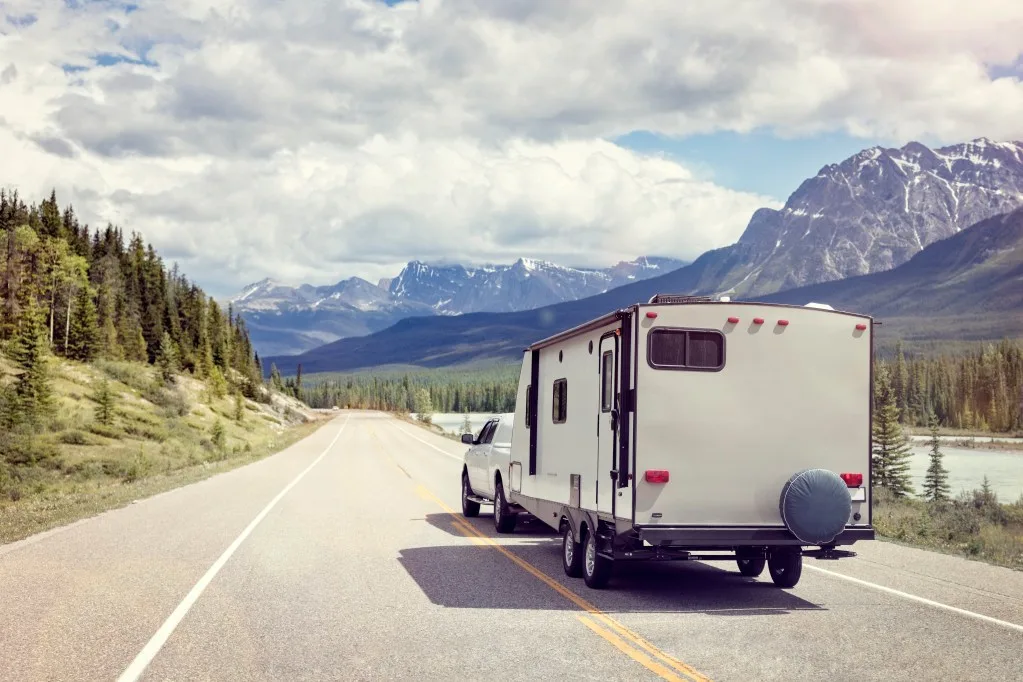With increased fuel prices during peak camping season, many drivers are looking for ways to improve their MPG when towing. Is it even possible?
While you may be paying more at the pump than you’d like, you can make the most out of every gallon of fuel you use when towing.
Doing so can help reduce the sting you feel every time you fill up your fuel tank.
Today, we’re sharing a few tips to help you improve your MPG when towing. Let’s dive in!
How Does Towing Affect MPG?
Towing any type of trailer will negatively affect your vehicle’s fuel economy. You’re increasing the vehicle’s weight and requiring the engine to work harder than usual. When your engine and vehicle work harder, it uses more fuel, and your MPG will plummet.
The more weight you add, the more you can expect your fuel economy to drop.
If the added weight isn’t enough, you must factor in the landscape of where you’re towing. Towing a trailer from one side of the flat state of Nebraska to the other is one thing, but towing up and over the Rocky Mountains is a different ballgame.
Your vehicle will need to work even harder when towing up steep grades. It’s not uncommon to see single-digit MPG in many vehicles when towing in hilly or mountainous areas.

Is Gas or Diesel Better for Towing?
When it comes to the battle between gas or diesel for towing, it’s not even close. While a gas engine may get more MPG when unhitched from a trailer, it simply can’t match the torque of a diesel engine.
The increased torque of a diesel engine means it doesn’t have to work nearly as hard when towing a heavy load. Research indicates that diesel engines aren’t just somewhat more efficient, but they’re 20% to 35% more efficient than gasoline engines.
Should You Use Premium Gas When Towing?
Despite having a higher octane than regular gas, premium gas will be of little help when it comes to towing. Premium gas doesn’t increase the power of the engine or its capabilities. However, it does help with efficiency and performance.
All towing capacities and limits remain the same whether you use regular or premium gas.
Pro Tip: Get the inside scoop about Is Premium Gas A Gimmick? The answer may surprise you!

How to Improve MPG When Towing
There are a few things you can do if you want to improve your MPG when towing to get the most out of your fuel. Doing one or two of these will have an impact, but you’ll want to apply all of them consistently to get the best results.
1. Check Your Tires
You want to check the tire pressure on your vehicle and the trailer you’re towing before each trip. Underinflated tires will decrease fuel economy and increase the potential for a tire blowout.
The U.S. Department of Energy researched and found that drivers experience a 0.2% decrease in gas mileage for every 1-psi drop in tire pressure. That may not seem like much, but it can result in tremendous savings over time.
Store a tire pressure gauge in your vehicle’s glove box or the side of your door. It only takes a minute or two to ensure that all of your tires are at safe and proper levels.
Having a portable air compressor can help you top off your tires if they’re low. Air compressors may be available at many gas stations but can be difficult to access when towing a trailer.
Pro Tip: Learn more about the impact driving with low tire pressure can have on your vehicle.
2. Slow Down
If you have a lead foot, we hate to tell you that it’s killing your MPG. You’re making your engine work harder by driving too fast. The harder your engine works, the more fuel it will use. Consumer Reports did a test and found that by slowing down 10 miles per hour, most vehicles increased their MPG by 6 to 8 miles per gallon.
While you may arrive at your destination a few minutes early, it doesn’t come without a cost. Slow down, and you’ll arrive at your destination with more fuel in your tank.
3. Reduce Weight
Overloading your vehicle or trailer is incredibly easy to do, especially when you go camping. There will likely be plenty of equipment, food, and other items you want to bring on your adventures. However, the heavier a trailer or vehicle is, the harder the engine will need to work. The harder your engine is working, the more fuel you will use.
As a result, you want to minimize the weight of your vehicle and trailer. If you’re not going to be using something, don’t bring it! You should only take the essentials and consider purchasing heavy items like firewood once you arrive at the campground.
Also, consider emptying your water tanks. Water weighs approximately 8 pounds per gallon and can quickly add up. Many RVs have water tanks that are 30 to 100 gallons, which means adding several hundred pounds of weight to your rig and drastically reducing your fuel economy.
4. Follow Maintenance Schedule
Vehicles deliver the best results and dependability when they’re properly maintained. As a result, manufacturers often provide maintenance schedules for owners to follow. Following these schedules helps ensure your vehicle remains in tip-top shape while delivering the best results.
By putting off maintenance or not following the manufacturer’s recommended maintenance schedule, you risk voiding warranties, reducing the life of your vehicle, and negatively impacting your fuel economy.

5. Have a Capable Vehicle
Some vehicles are more capable than others when it comes to towing. Hitching up a trailer to a less-than-capable vehicle kills your fuel economy and can put you and other drivers in danger. Manufacturers set towing limits and capacities to maximum safe capabilities of the engine and other critical parts of a vehicle.
If you’re up against your vehicle’s towing capabilities, don’t expect stellar fuel economy. If you’re planning to tow regularly, you’ll want to invest in a capable vehicle. Failing to do so will result in spending more at the pump and damaging your vehicle.
6. Avoid Idling
It’s easy to calculate your fuel economy when your engine is idling; it’s zero miles per gallon. Many modern vehicles shut off when it detects you’ve stopped at a red light. Anytime you’re planning to sit idle, shut off your engine so you can only use your fuel for driving.
Over the past couple of decades, states have begun restricting the practice of vehicle idling. Some states have idling limits from three to five minutes before a driver can receive a citation.
Not only does idling waste gas, but it also creates unnecessary pollution.
Boost Your MPG While Towing
While towing a trailer to a campground can be exciting, watching your fuel economy plummet is not. However, if you follow the tips we’ve shared with you today, you’ll be able to improve your MPG while towing. It doesn’t matter what the price at the pump says; you’ll enjoy the benefits of better MPG.
What do you do to improve your MPG when towing? Tell us your tips in the comments!
Discover the Best Free Camping Across the USA
To be honest with you, we hate paying for camping. There are so many free campsites in America (with complete privacy).
You should give it a try!
As a matter of fact, these free campsites are yours. Every time you pay federal taxes, you’re contributing to these lands.
Become a FREE CAMPING INSIDER and join the 100,000 campers that love to score the best site!
We’ll send you the 50 Best Free Campsites in the USA (one per state). Access the list by submitting your email below: